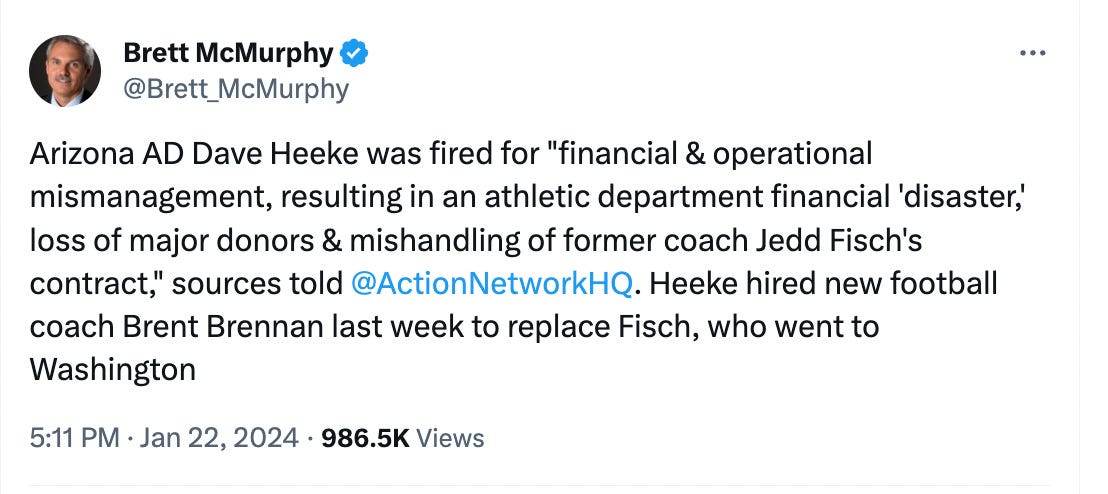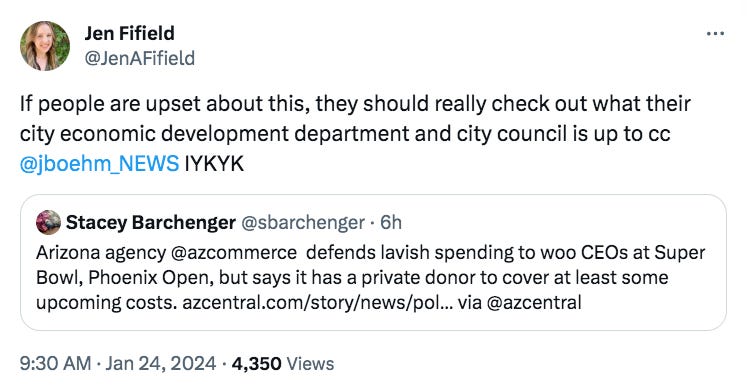The Daily Agenda: UA student-athletes pay the price
The UA made cuts to at least one sports program days before winter break ... When we asked what other teams were impacted, they wouldn't tell us ... Oro Valley says 'no' to more apartments.
University of Arizona Athletics Director Dave Heeke is on his way out, a casualty of the school’s multimillion dollar financial crisis. But he’s not the only member of the athletics department who took a hit.
We’re not talking about any assistant coaches or support staff who may have been quietly let go (the UA hasn’t exactly been forthcoming with news about who’s staying and who’s going.)
We’re talking about non-scholarship student-athletes, at least two of whom were cut from their program on Dec. 13 — the penultimate day of the fall semester — leaving them without enough time to transfer to another program for the spring.
The Tucson Agenda received a copy of a letter signed by all 14 members of the cross country team, calling out Heeke, Director of Cross Country and Track and Field Fred Harvey and several senior athletics department officials for a “lack of transparency and accountability” within the program.
“The Arizona Cross Country Team is writing to you out of complete frustration and disgust,” the letter began. “The (team) does not understand … the clear pattern of poor transparency, planning and consideration from the top.”
They took issue with the timeline of their teammates’ removal, saying that other runners who were at risk of being cut were told by Oct. 12, allowing them time to consider their options for the spring semester.
A quick note: We’re not naming these student-athletes because they didn’t approach us about writing an article. We got their names from the letter and were able to confirm that they’re no longer with the team, but we don’t want our reporting to impact their chances of being signed to another team.
Two student-athletes losing their roster spots might not sound like a big deal and in the grand scheme of things, maybe it’s not.
Cutting two student-athletes who were not receiving scholarships wouldn’t make the kind of financial difference necessary to help pull the department or the UA out of the red, so we figured there must have been cuts made to other teams, too.
We asked athletics department spokesman Matt Ensor for the number of student-athletes cut from each team on or after December 13 to try to get a sense of the overall impact to student-athletes.
But here’s the part that made Caitlin’s Spidey-sense tingle: He wouldn’t give us any numbers. Instead, he sent along several carefully worded sentences on behalf of the department.
“Arizona Athletics has maintained roster sizes for all its programs for many years. When the NCAA provided COVID exemptions for student-athletes as well as the deregulation of bylaws such as unlimited meals and snacks, travel expenses and increased academic support and awards, each program updated their roster maintenance process to best utilize all its resources.”
“Different programs make roster decisions at different times of the year depending on their playing season structure. Track & Field historically makes their roster decisions after certain meets in December. Roster decisions were aligned with standard procedures and not directly related to budget reductions or the financial action plan.”
“When there is a roster change in the middle of a year those student-athletes may continue to utilize the academic and medical services offered for the remainder of the semester.”
It’s weird that he wouldn’t just tell us. If roster cuts like these are normal and weren’t related to the financial crisis as the statement said, why not just tell us what’s going on with the other programs?
But this isn’t just about the student-athletes who were cut. It also impacts those who remain in the program.
The teams’ letter said that the cuts put the men’s roster in a bad position and added “unnecessary stress and pressure” on the eight remaining runners to stay healthy and that the small roster size renders them “barely a cross country team.”
“(We) were told it is a growing program, however it clearly seems to be a shrinking program that will go so far as to cut freshman,” the letter said, adding that a similar situation is already playing out on the women’s roster, with only six runners left on the team.
And with several members of both the men’s and women’s teams set to graduate in May, the number of student-athletes returning for the fall cross country season is down to the single digits. That makes it tough to recruit new student-athletes to the program, the letter says.
“(We) can’t imagine how you are supposed to encourage a runner to come here with a team of two,” the letter says. “With the trajectory that they are on right now, the cross country program will cease to exist in the upcoming years.”
And once news of the program’s struggles starts spreading throughout the track community, the UA will have an even harder time recruiting within the United States, according to the letter.
“(This will force) us to recruit outside of the country because it’s easier to hide the truth from them,” the letter said. “If we are concerned about the budget, why are we kicking off free, freshman athletes … and instead bringing in expensive international athletes?”
That’s a great question.
The athletes requested a Zoom meeting with Director of Cross Country and Track and Field Harvey and the athletics department’s Director of Development James Francis to explain why the late-semester cuts happened and what they envision as the future of the program, but it’s not clear if that meeting ever happened.
“Though this might not be pressing for you all, it is for us,” the letter said. “It directly affects our team, our opportunities, our coaches and ultimately our well-being.”
The Arizona Board of Regents are holding a special meeting today to discuss contracts for all three universities’ head football coaches. They’ll also get an update from Executive Director and Interim UA Chief Financial Officer John Arnold on “outcomes to date” since he stepped into the position last month. We’ll be interested in hearing what he has to say.
And we’re not giving up on our question about roster cuts. We’ve put in an official and expanded record request for roster numbers for every team before and after winter break. We’ll report back what we find when we get a response. Until then, we welcome members of the campus community to share stories about how the budget issues have impacted their lives. Send those to caitlin@tucsonagenda.com
There are plenty of details left to uncover about the UA’s finances and money saving efforts, and we’re going to keep asking for answers. But producing rigorous, in-depth reporting takes time and money, and we can’t do it without you support.
Dominoes falling: UA Athletics Director Dave Heeke’s departure was “long overdue,” members of the university’s Faculty Senate told KGUN’s Ryan Fish. They noted the loans the university made to the Athletics Department, which were not repaid and left academic staff bearing the financial burden. UA sources told Fish there could be more dominoes yet to fall in the department as the UA deals with the fallout from the financial crisis.
That’s a hard “no”: After a blistering public hearing, the Oro Valley Town Council nixed a rezoning request to that would have paved the way for 88 one-story apartments north of Rancho Vistoso’s Safeway Plaza, Tucson Local Media’s Dave Perry reports. The council’s decision led the developer to withdraw a separate plan to build another 119 apartments north of Tangerine Road. More than 1,000 residents signed a petition opposing the rezoning request. Town staff said much of the area is zoned for commercial development, but it hasn’t really attracted any such development due to the lack of nearby residents.
Healing place: The first medical respite center for people experiencing homelessness is coming to Tucson, the Arizona Daily Star’s Gabriela Rico reports. Casa de Respiro at 4550 S. Palo Verde Road will provide a place for them to heal after they leave the hospital. The respite center is a collaboration among El Rio Health Center, Catholic Community Services, and the H.S. Lopez Family Foundation. They’re expecting to serve about 1,500 people every year.
Prison for Jan. 6: Two Tucson siblings were sentenced to about a month in federal prison for their involvement in the Jan. 6 Capitol riot, KVOA’s Zachary Jackson reports. Felicia and Cory Konold, both in their late 20s, joined the Proud Boys and breached the Capitol. Felicia talked about the riot on social media afterwards and Cory took home a helmet used by Capitol police, which a family member later turned over to law enforcement.
Tucson hits the red carpet: A movie made by a Tucsonan got five Oscar nominations, the Star’s Cathalena Burch reports. Cord Jefferson wrote and directed “American Fiction,” which was nominated for best film, best adapted screenplay, original score, best actor, and best supporting actor. Jefferson, a graduate of Canyon del Oro High School, snuck a little bit of Tucson into the movie, including the names of his middle school and high school friends’ bands.
Hobbs comes to town: Arizona Gov. Katie Hobbs was in Tucson on Tuesday to deliver her State of the State address, the Arizona Luminaria’s Kiara Adams reports. Hobbs focused on improving Interstate 10 between Tucson and Phoenix, affordable housing, the increase in cross-border immigration in Southern Arizona, and water conservation.
$150,000: The annual salary of UA Director of Cross Country and Track and Field Fred Harvey in fiscal year 2023. This isn’t the first time in recent years that members of the cross country team have expressed frustration with leadership decisions. In 2020, Caitlin spoke with 20 current and former runners who complained of abusive and neglectful practices by coaches and athletics department leadership.









